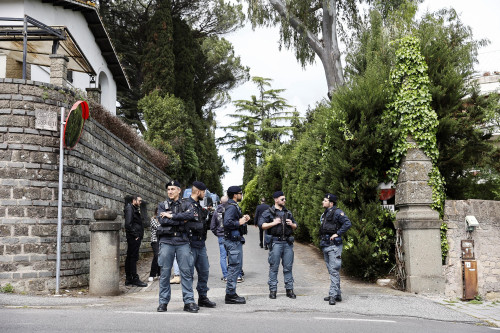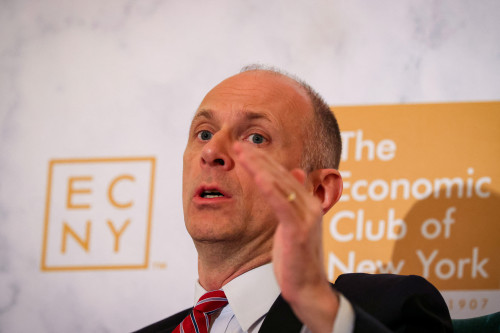By Trevor Hunnicutt
WASHINGTON (Reuters) -U.S. President Joe Biden welcomes the heads of NATO member states to Washington on Tuesday for an annual summit that gives the embattled Democrat an international stage to convince allies at home and abroad he can still lead.
Biden, 81, has vowed to press on in his race against Republican Donald Trump, 78, despite concern from Democrats on Capitol Hill and donors that he will lose the Nov. 5 election after a halting debate performance on June 27.
Biden made restoring the United States’ traditional alliances abroad to counter the threat of autocracies the centerpiece of his foreign policy after Trump challenged allies as part of an “America First” approach. Who wins in November could have a substantial impact on NATO’s and Europe’s future.
Trump has suggested that, given a second term, he would not defend NATO members that did not meet the alliance’s defense spending target of 2% of their respective GDP if they came under military attack. He has also questioned the amount of aid given to Ukraine in its battle against Russia’s invasion.
Aides said Biden’s opening speech expected at 5 p.m. Eastern time (2100 GMT) will highlight what his administration sees as a key accomplishment: a stronger and more united NATO, under Washington’s leadership, with more members and a resolve to meet their collective security needs.
That brings, they say, tangible results for American voters: a safer country, with a strong international economic position, more alliances and power abroad, and less at risk of conflict with its adversaries.
“That’s not by accident,” White House spokesperson John Kirby told reporters on Monday. “That’s because of leadership. That’s because of constant stewardship of the alliance.”
The mere presence of leaders from NATO and beyond shows Biden’s power to assemble coalitions and inspire confidence, Kirby said, arguments that Trump and many of his Republican allies reject.
“Republicans, of course, celebrate the peace and prosperity that NATO has secured and will continue to stand by our partners as we prevent needless wars,” said U.S. House of Representatives Speaker Mike Johnson, a top Republican and Trump ally, on Monday. “But we also believe that NATO needs to be doing more.”
NATO, celebrating its 75th anniversary, has found new purpose in opposing Russian President Vladimir Putin’s invasion and welcomed Finland and Sweden as new members.
The grinding Ukraine-Russia war will dominate private conversations between the leaders of the 32 NATO member countries, who have a full agenda focused on military and financial aid for Ukraine and offering some pathway toward eventual NATO membership for Kyiv.
But those leaders, already anxious about the prospect of Trump’s return, come to Washington with fresh concern about Biden’s staying power, according to diplomats from their countries. One described Biden as bruised after a difficult political period and said their government was looking for signs about whether he would survive.
More than a week after the debate, Biden continues to face daily questions about his fitness for office and a punishing election campaign. Some Democratic lawmakers have called for him to end his campaign.
Joern Fleck, senior director of the Europe Center at the Atlantic Council, said questions about Biden’s survival were “absolutely on everyone’s minds” and raised the prospect that Trump could win the U.S. election and weaken the alliance.
NATO leaders face political uncertainty in Europe, with paralysis looming in France after gains for left and far right parties, and German Chancellor Olaf Scholz’s coalition weakened after a poor showing in European Parliament elections.
The week’s events in Washington will give Biden a chance to address the concerns, including a high profile speech on Tuesday and a rare solo press conference on Thursday.
Biden will also highlight new support for Ukraine. During the summit, NATO leaders are expected to endorse an initiative that will see the alliance coordinate arms supplies and training for Ukrainian forces fighting Russia’s invasion. They may also get more support on air defense.
Ukraine ultimately wants to join NATO to ward against further future attacks by Russia, but candidates have to be approved by all of the alliance’s members, some of which are wary of provoking a direct war with Russia.
Moscow sees NATO as a vehicle for U.S. dominance and has accused the alliance of returning to a Cold War mindset.
U.S. officials have said the summit will offer Ukraine a “bridge to membership,” which would include the new NATO effort to coordinate arms supplies and training.
Some members want the alliance to make clear Ukraine is moving toward NATO “irreversibly” and are keen for language in a statement emerging from the summit to move beyond the alliance’s pledge last year that “Ukraine’s future is in NATO.”
Ukrainian President Volodymyr Zelenskiy is expected to attend the summit and meet with Biden.
(Reporting by Trevor Hunnicutt; Additional reporting by Andrea Shalal; Editing by Michael Perry and Tomasz Janowski)



